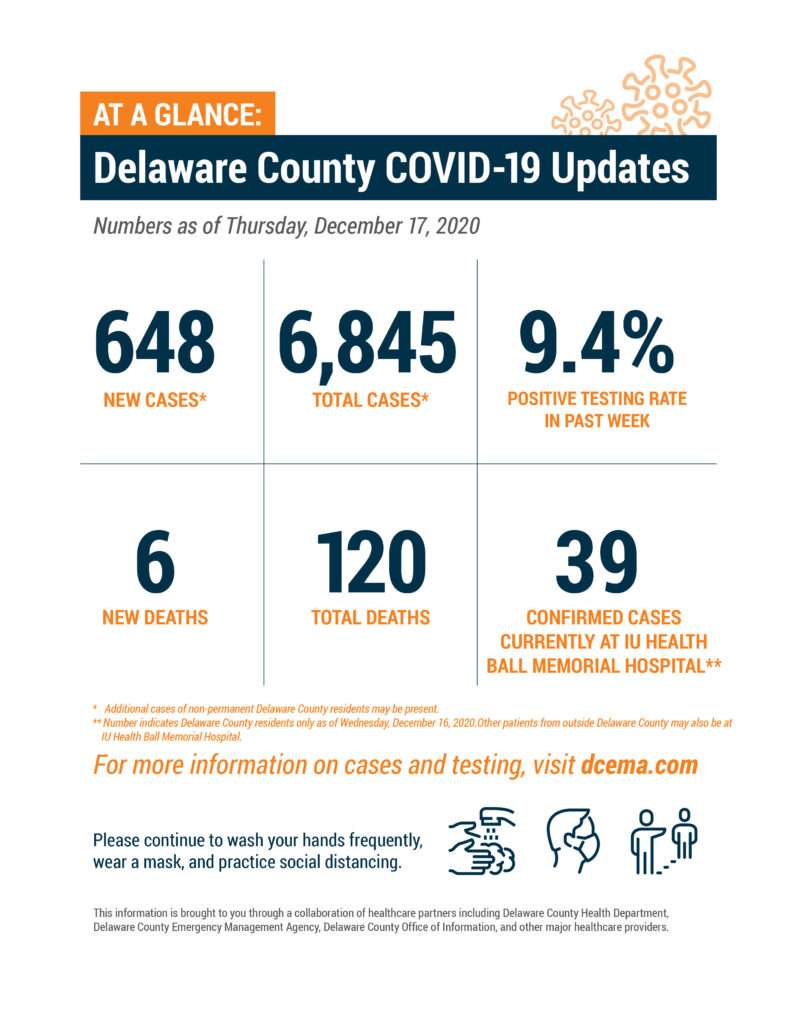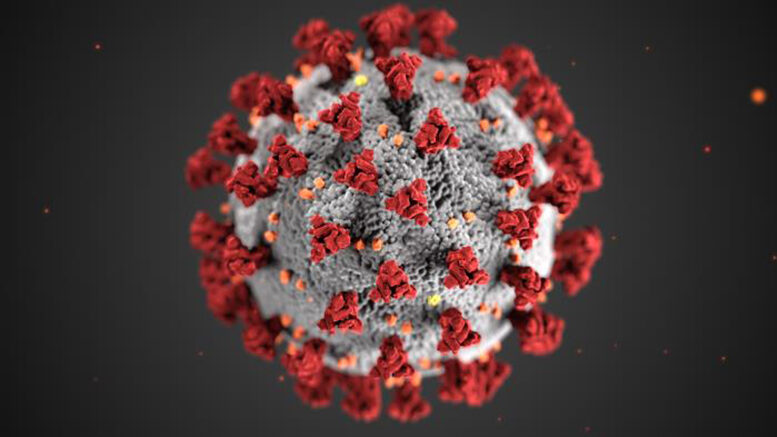Editor’s note: The following COVID-19 update is brought to you through a collaboration of healthcare partners including Delaware County Health Department, Delaware County Emergency Management Agency, Delaware County Office of Information, and other major healthcare providers. Delaware County weekly COVID-19 updates are released every Thursday and include information from the Indiana State Department of Health county metrics dashboard, which is updated every Wednesday afternoon. Due to the holidays, next week’s update will be released on Wednesday, Dec. 23. There will be no update the week of Dec. 28. Updates will resume in January 2021.
Once again, Delaware County has remained orange on the Indiana State Department of Health’s county metrics map. Orange is the second-to-worst score a county can receive, indicating moderate to high level of community spread of COVID-19. The entire state remains either orange or red (the worst score a county can receive) as we head further into the holiday season.

“COVID has no boundaries, so it is important to be safe, stay vigilant, wear masks and stay away from others when you can,” said Dr. Sarfraz Khan, chief medical director of Meridian Health Services. “Life is more important than having a relaxed moment, which can risk your life or the life of your near and dear ones.”
Since last week’s update on Dec. 10, Delaware County has reported 648 new cases and 6 new deaths. The county’s positivity rate is at 9.4%; the CDC suggests this number should be well under 5%.
As of Dec. 16, IU Health Ball Memorial Hospital is treating 68 confirmed cases of COVID-19, 39 of which are Delaware County residents.
“I defer to the quote from the American Historian, Henry Adams, ‘I expected the worst, and it was worse than I expected,’” said Hank Milius, President/CEO, Meridian Health Services. “The COVID-19 pandemic is nothing like any of us have experienced, and I am proud of all the healthcare heroes here and throughout the country in caring for so many people with so many unknowns occurring while being able to adjust constantly.”
Abbey Collis, a social worker with IU Health Ball Memorial’s psychiatry/emergency department, echoed these sentiments, saying the unknowns are the most difficult aspect of her job.
“People are scared of what is going to happen next, people are scared of losing loved ones or not having the resources they need to live,” Collis said. “The hardest part of working in behavioral health during COVID has been the fear of the unknown, consoling an upset patient who doesn’t know when this is going to end or when things are going to go back to ‘normal’—whatever that is going to look like—when I don’t even know when that is going to happen myself.”
IU Health Ball Memorial is set to begin administering first doses of the Pfizer vaccine starting tomorrow, Dec. 18. Healthcare workers on the front lines of treating COVID-19 will be the first to receive the vaccines.
While the speedy distribution of vaccines offers a glimmer of hope for a “return to normal,” health officials still warn about getting too comfortable. It’s still important to wear a mask, wash your hands and practice social distancing—even over the holidays.
“Please think of your loved ones as we get closer to holidays and celebrate at home with the family you live with only,” said Kelly Stephens, manager of Open Door Health Services’ COVID-19 testing sites. “Make plans to celebrate smaller this year as we all do our part to protect each other, particularly the elderly and other vulnerable individuals.”
Milius recently published a letter to the community that further explains that the “holidays may require sacrifice” this year.
For more information on Delaware County’s COVID-19 total cases and deaths, as well as testing location information, visit dcema.com. Testing location hours may vary during the next few weeks due to the holidays. Additional updates on vaccine information and planning can be found on the state’s website.
Frequently Asked Questions
Will vaccines allow an immediate return to normal? What should people expect over the next few months?
We should not expect a significant impact from the vaccines anytime soon. The vaccine supply will arrive in phases and is expected to be very limited in quantity initially.
I got tested for COVID-19. Now what?
Individuals who get tested because they have symptoms should quarantine after their test until they receive their results. If the test is positive, they must continue to isolate. Isolation can end after ALL of the following have occurred:
- 10 days have passed since onset of symptoms
- If fever was a symptom, 24 hours have passed with no fever, without use of fever-reducing drugs
- Other symptoms are improving (however, loss of taste/smell may persist and does not to be factored into this requirement)
However, a person who has tested positive should follow their healthcare provider’s advice on when to end isolation.
The official recommendation for quarantine of someone identified as a close contact remains at 14 days. The CDC has recently announced options for shortening this timeframe to 10 or even possibly 7 days, if certain criteria are met. We suggest these options only be considered for use by individuals who would fall under the CDC guidelines for “Critical Infrastructure.” Employers retain the ability to, and are recommended to, require 14-day quarantine of any potentially exposed staff members. The 7- and 10-day options, in summary:
- Quarantine can end after day 10 without testing and if NO symptoms have been reported during daily monitoring.
- When testing is readily available, quarantine can end as early as day 7 with a negative test result;
HOWEVER, the test can be conducted no earlier than day 5 of the quarantine period.
In either situation, after stopping quarantine, people should
- Watch for symptoms until 14 days after exposure.
- If they have symptoms, immediately self-isolate and contact their local public health authority or healthcare provider, as well as their employer if necessary.
- Wear a mask, stay at least 6 feet from others, wash their hands, and avoid crowds.
Again, the standing recommendation for quarantine of close contacts remains at 14 days.
For more information, please visit cdc.gov/coronavirus/2019-ncov/if-you-are-sick/quarantine or cdc.gov/coronavirus/2019-ncov/more/scientific-brief-options-to-reduce-quarantine.
What is a “close contact”?
The CDC definition of “close contact” includes the following:
- You were within 6 feet of someone who has COVID-19 for a total of 15 minutes or more, with or without masks. (This is 15 total minutes over the course of 24 hours. E.g., three five-minute periods of time throughout one day would count as close contact. )
- You provided care at home to someone who is sick with COVID-19.
- You had direct physical contact with the person (hugged or kissed them).
- You shared eating or drinking utensils.
- They sneezed, coughed, or somehow got respiratory droplets on on you.
Should I/my child get tested for COVID-19 even if only mild cold-like symptoms, like a runny nose, are present?
Anyone experiencing symptoms of illness should isolate at home to avoid the risk of spreading illness to others. With the improved availability of testing, DCHD would further recommend testing to any such individual. Additional information concerning when you can return to work and what to do if your test is positive is available for review at cdc.gov.
If I test positive for COVID-19, how should close contacts be informed?
Anyone who tests positive should proactively seek to notify anyone they have had close contact with, as far back as 48 hours before their symptom onset. Positive individuals should also cooperate with any contact tracing calls they receive from the State, so that state contact tracers can also document and notify close contacts of their need to quarantine.
What should I do if I witness a business and/or citizen failing to comply with guidelines from the state or county?
Complaints can be lodged through the Delaware County Health Department Citizen Complaint Form, most easily available through the Delaware County Coronavirus Hub at dcema.com.
Will getting a flu shot protect me from COVID-19?
While some evidence exists that the flu vaccine may help with protection against COVID-19, this vaccine should not be considered a protection against COVID-19. Instead, protection against influenza infection may prove beneficial to the population by lowering the number of flu illnesses overall and freeing up space in the healthcare system for those infected with COVID-19 or needing other healthcare.
What are the symptoms of COVID-19?
People who have COVID-19 may exhibit any range of these symptoms, and some may even show no symptoms at all. Symptoms may appear 2–14 days after being exposed to the virus. Some symptoms of COVID-19 include:
- Fever or chills
- Cough
- Shortness of breath or difficulty breathing
- Fatigue
- Muscle or body aches
- Headache
- New loss of taste or smell
- Sore throat
- Congestion or runny nose
- Nausea or vomiting
- Diarrhea
Anyone with these symptoms should stay home as much as possible and limit their exposure to others. Children who have any of the above symptoms should be kept home from school. For more information, read the Indiana State Department of Health’s guidelines for returning to school here.
Families with children in school can find additional information and resources at educationsupporthub.com.
What should I do if I think I might have COVID-19?
If you have any of the above symptoms or have been in contact with someone who tested positive for COVID-19, you should immediately begin to self-quarantine to prevent spreading the disease to others. You should also call a local health clinic to arrange to be tested. Follow your doctor’s orders and continue to self-quarantine until you receive negative test results.
Children who exhibit any of the above symptoms should NOT be sent to school. If your child shows any of the listed symptoms, keep the child home in quarantine and contact your healthcare provider for further guidance. Families with children in school can find additional information and resources at educationsupporthub.com.
Where can I get tested?
Several local health clinics offer COVID-19 tests, including Meridian Health Services, Open Door Health Services, and more.
Open Door offers free community tests for individuals with or without symptoms, made available through a partnership with the Delaware County Health Department. Those who wish to get tested are encouraged to register online in advance at opendoorhs.org/testing for a quicker testing visit. For anyone unable to pre-register, on-site registration is available.
Open Door also provides neighborhood-based testing. These sites currently include the Buley Center on the second and fourth Tuesday of every month from 9 a.m. until 1 p.m., as well as Avondale United Methodist Church every Thursday from 2–5 p.m. The program will continue to grow; visit opendoorhs.org/testing for additions or changes to the schedule.
For a complete list of testing locations in Delaware County, visit the Delaware County Indiana Coronavirus Hub. Be advised that some locations may test only those who exhibit symptoms of COVID-19. Testing location hours may vary during the next few weeks due to the holidays.
Staying Safe from COVID-19
To keep yourself safe from COVID-19 and to reduce the spread of the disease, wash your hands often for at least 20 seconds, wear a mask when inside public spaces and when in crowded areas, and practice social distancing.
If you have symptoms of COVID-19 or have been in contact with someone who tested positive, schedule an appointment to get tested as soon as possible. Self-quarantine until you have received negative test results. A list of testing locations can be found on the Delaware County Indiana Coronavirus hub.
Under state mandate, gatherings in Delaware County are currently limited to no more than 50 people. Events with more than 50 attendees will not be approved by the Delaware County Health Department.



